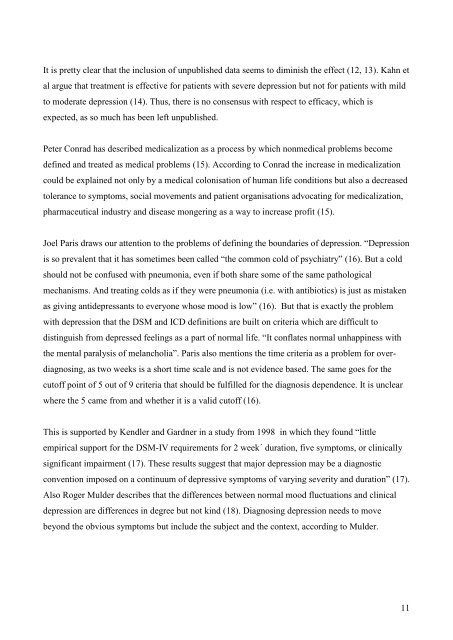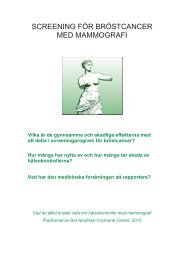1 Selective serotonin reuptake inhibitors (SSRI) â sales, withdrawal ...
1 Selective serotonin reuptake inhibitors (SSRI) â sales, withdrawal ...
1 Selective serotonin reuptake inhibitors (SSRI) â sales, withdrawal ...
You also want an ePaper? Increase the reach of your titles
YUMPU automatically turns print PDFs into web optimized ePapers that Google loves.
It is pretty clear that the inclusion of unpublished data seems to diminish the effect (12, 13). Kahn et<br />
al argue that treatment is effective for patients with severe depression but not for patients with mild<br />
to moderate depression (14). Thus, there is no consensus with respect to efficacy, which is<br />
expected, as so much has been left unpublished.<br />
Peter Conrad has described medicalization as a process by which nonmedical problems become<br />
defined and treated as medical problems (15). According to Conrad the increase in medicalization<br />
could be explained not only by a medical colonisation of human life conditions but also a decreased<br />
tolerance to symptoms, social movements and patient organisations advocating for medicalization,<br />
pharmaceutical industry and disease mongering as a way to increase profit (15).<br />
Joel Paris draws our attention to the problems of defining the boundaries of depression. “Depression<br />
is so prevalent that it has sometimes been called “the common cold of psychiatry” (16). But a cold<br />
should not be confused with pneumonia, even if both share some of the same pathological<br />
mechanisms. And treating colds as if they were pneumonia (i.e. with antibiotics) is just as mistaken<br />
as giving antidepressants to everyone whose mood is low” (16). But that is exactly the problem<br />
with depression that the DSM and ICD definitions are built on criteria which are difficult to<br />
distinguish from depressed feelings as a part of normal life. “It conflates normal unhappiness with<br />
the mental paralysis of melancholia”. Paris also mentions the time criteria as a problem for overdiagnosing,<br />
as two weeks is a short time scale and is not evidence based. The same goes for the<br />
cutoff point of 5 out of 9 criteria that should be fulfilled for the diagnosis dependence. It is unclear<br />
where the 5 came from and whether it is a valid cutoff (16).<br />
This is supported by Kendler and Gardner in a study from 1998 in which they found “little<br />
empirical support for the DSM-IV requirements for 2 week´ duration, five symptoms, or clinically<br />
significant impairment (17). These results suggest that major depression may be a diagnostic<br />
convention imposed on a continuum of depressive symptoms of varying severity and duration” (17).<br />
Also Roger Mulder describes that the differences between normal mood fluctuations and clinical<br />
depression are differences in degree but not kind (18). Diagnosing depression needs to move<br />
beyond the obvious symptoms but include the subject and the context, according to Mulder.<br />
11





